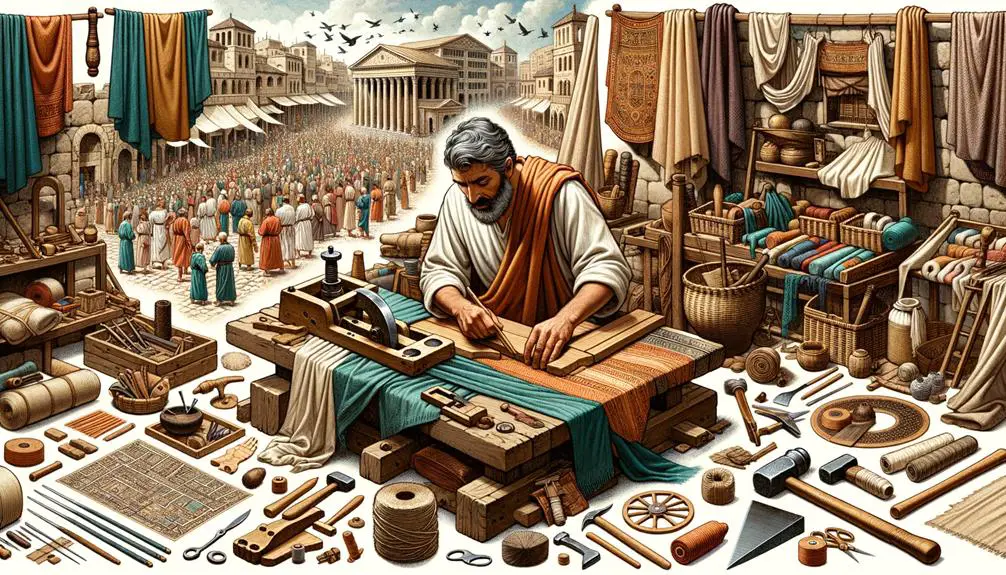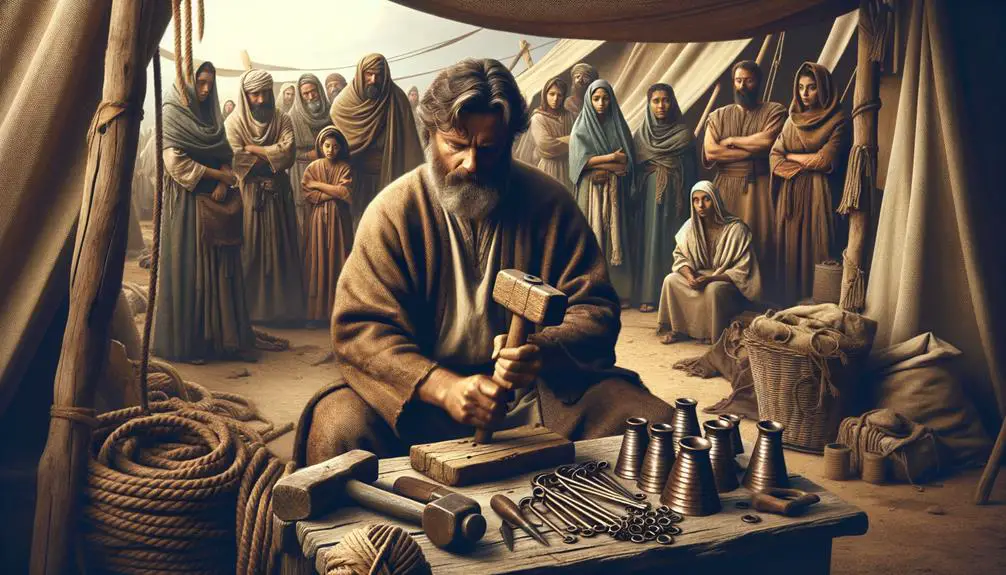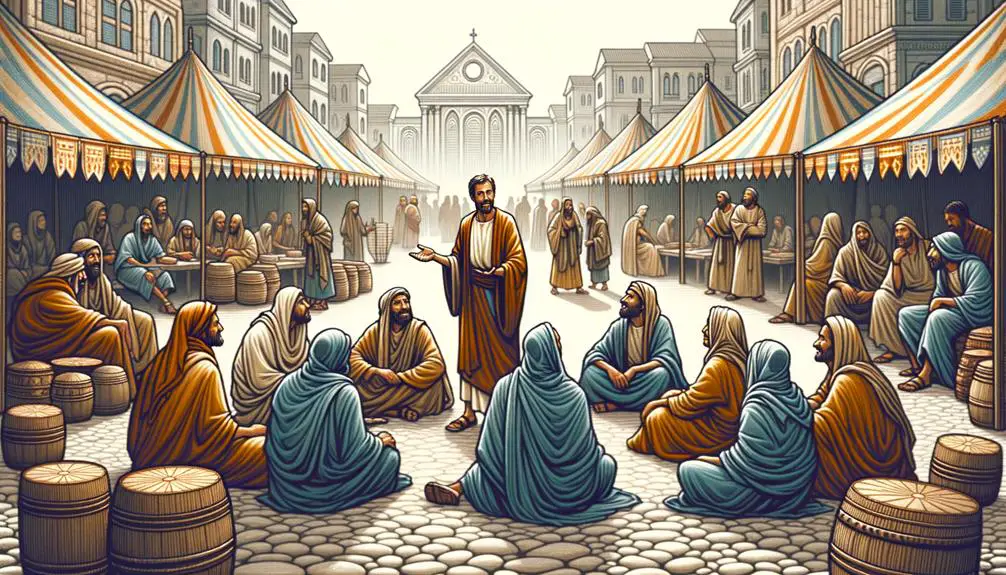Journey into discovering how Paul's trade as a tentmaker intricately shaped his ministry and spread of the early Christian message.

What Was Paul's Trade in the Bible
When you think about Paul the Apostle, you're likely to conjure images of his missionary journeys or his profound letters in the New Testament. What you might not immediately recall is that Paul was also a tentmaker by trade. This profession was more than just a way to make ends meet; it played a significant role in his ministry and the early Christian community.
As you explore the layers of Paul's identity beyond his apostolic calling, you'll uncover how his craftsmanship influenced not only his approach to missionary work but also offered him unique opportunities to spread the Gospel. This intersection of daily work and divine mission invites a closer look into how vocational skills were woven into the fabric of early Christian evangelism.
Key Takeaways
- Paul's trade as a tentmaker combined practical skills with his religious mission.
- His tentmaking skills provided financial independence and a platform for outreach.
- Vocational skills, like tentmaking, played a crucial role in Paul's missions and ministry.
- Paul's craftsmanship and trade choices were deeply intertwined with his Christian identity and community impact.
Paul's Occupation Revealed

Paul's trade, deeply rooted in his cultural and religious background, was that of a tentmaker, a profession that not only supported him financially but also shaped his interactions and ministry throughout his journeys. As a tentmaker, Paul's work involved more than just the manual task of constructing shelters. It encompassed a wide range of crafting techniques, from selecting durable materials to applying intricate sewing methods that ensured the tents could withstand harsh weather conditions. This skill set wasn't only practical but also highly valued in the communities he visited, providing him with a unique entry point for engaging with different cultures and social groups.
The professional ethics that governed Paul's work as a tentmaker also played a crucial role in his broader mission. He adhered to principles of honesty, quality, and fairness in his trade, reflecting the moral teachings he sought to spread. These ethics weren't mere rules but a testament to his integrity and dedication, characteristics that bolstered his credibility and influence among those he encountered.
Moreover, Paul's commitment to his trade served as a powerful example of the dignity of labor, challenging societal norms that often undervalued manual work. His ability to balance his vocational responsibilities with his spiritual calling underscored the significance of hard work and perseverance, themes that resonated deeply within the early Christian communities.
In analyzing Paul's occupation, it's clear that his role as a tentmaker was integral to his identity and mission. The crafting techniques he mastered and the professional ethics he embodied weren't just aspects of his work but pillars of his ministry, influencing both his approach to evangelism and his interactions with the diverse communities he served.
The Significance of Tentmaking
ARTICLE TITLE: Paul's Trade in the Bible
PREVIOUS SUBTOPIC: 'Paul's Occupation Revealed'
CURRENT SUBTOPIC: 'The Significance of Tentmaking'
Exploring the significance of tentmaking reveals its profound impact on both Paul's ministry and the early Christian community, illustrating how this trade was far more than a mere occupation. Tentmaking, as Paul's chosen profession, allowed him a level of independence, enabling him to travel and preach without being a financial burden on the communities he visited. This aspect of his work fostered a sense of trust and respect between Paul and those he ministered to, demonstrating the value of self-sufficiency within Christian ministry.
Material sourcing for tentmaking in Paul's time involved utilizing locally available materials, which required a deep understanding of regional resources. This aspect of his trade underscores the importance of adaptability and resourcefulness, qualities that are as relevant today as they were in Paul's time. The table below highlights key aspects of tentmaking and their modern parallels, painting a vivid picture of this ancient trade's enduring relevance.
Aspect of Tentmaking |
Modern Parallel |
|---|---|
Material sourcing |
Local procurement strategies |
Craftsmanship |
Skilled labor and artisanal work |
Financial independence |
Entrepreneurship |
Community service |
Social enterprise |
Evangelical tool |
Platform for outreach |
These parallels show how tentmaking was not just a means for Paul to support himself but also a way to engage with and serve the communities he worked in. It's a model that encourages modern believers to consider how their professions can serve a greater purpose.
Biblical Evidence of Paul's Trade

You'll find that the Bible provides clear insights into Paul's professional background, particularly his skill in tentmaking. This expertise isn't only mentioned explicitly but also highlights its critical role in his missions.
Analyzing these references sheds light on how Paul's vocational skills supported his apostolic endeavors.
Paul's Professional Background
Delving into the New Testament, one finds clear evidence that Paul's trade was tent-making, showcasing his hands-on skill set beyond his theological contributions. This aspect of his life offers a glimpse into the everyday world in which he lived and worked, bridging his educational background with practical expertise.
Before his religious conversion, Paul, also known as Saul, was deeply rooted in Jewish traditions, studying under Gamaliel, a renowned teacher of the law. This blend of rigorous religious training and manual labor underscores Paul's multifaceted character, highlighting how his vocational skills supported his missionary journeys.
His ability to balance these elements showcases not just a pragmatic approach to life but also a strategic one, leveraging his tent-making skills to facilitate his broader mission.
Tentmaking References
In the New Testament, specific passages provide direct evidence of Paul's trade as a tentmaker, underscoring the practical dimensions of his ministry. This role highlights his engagement with material sourcing and ancient entrepreneurship, essential aspects of his daily life and work.
- Material sourcing: Paul's tentmaking required knowledge of materials, such as leather or woven fabrics, crucial for creating durable tents. This expertise implies a deep understanding of resource acquisition and quality assessment.
- Craftsmanship: The meticulous crafting of tents demonstrates Paul's skill and dedication to his trade, reflecting the precision and care in his work.
- Ancient entrepreneurship: Engaging in tentmaking showcases Paul's participation in the marketplace, navigating the economic realities of his time, and connecting his ministry with broader societal structures.
Skill Importance in Missions
Paul's proficiency in tentmaking played a crucial role in his missionary endeavors, demonstrating how vocational skills can significantly enhance the effectiveness of spiritual missions. By engaging in vocational evangelism, Paul was not only able to support himself financially but also bridge cultural gaps, facilitating his cultural adaptation and acceptance in diverse communities. This approach underscored the value of blending vocational expertise with spiritual vocation, offering a model for contemporary missions.
Emotional Impact |
Vocational Skill |
|---|---|
Empathy |
Tentmaking |
Connection |
Cultural Adaptation |
Inspiration |
Self-Sufficiency |
Respect |
Hard Work |
Empowerment |
Vocational Evangelism |
His work ethic and ability to adapt culturally through his trade highlight the timeless relevance of vocational skills in mission work, inspiring believers to consider how their own skills can serve their faith and community.
The Role of Craftsmanship in Paul's Ministry

Craftsmanship played a pivotal role in shaping both the ministry and personal life of the Apostle Paul, demonstrating how vocational skills can serve broader spiritual and communal objectives. Paul's trade as a tentmaker wasn't just a means of livelihood; it was intricately woven into his approach to ministry and evangelism, reflecting a profound integration of craftsmanship values with his spiritual mission. This blending of skill and service underscores the multifaceted nature of Paul's ministry, revealing how he leveraged his professional expertise to further the Gospel message in practical and relatable ways.
- Ministry Integration: Paul's craftsmanship provided a platform for ministry, allowing him to interact with diverse communities. It served as an entry point for conversations about faith, illustrating the gospel's relevance to everyday life. This approach not only facilitated the spread of Christianity but also demonstrated a model of ministry that values work as an act of worship.
- Craftsmanship Values: The qualities inherent in Paul's trade—diligence, integrity, and excellence—mirrored the ethical teachings he espoused. By embodying these values in his work, Paul set a tangible example for new believers, emphasizing the importance of character in the Christian life.
- Community Impact: Beyond personal sustenance, Paul's trade enabled him to support his companions and contribute to the needs of the communities he served. This aspect of his ministry highlighted the role of craftsmanship in fostering communal well-being and solidarity among early Christians.
In weaving together his vocational skills with his spiritual calling, Paul illuminated a path of ministry deeply rooted in practical service, integrity, and community engagement.
Economic Context of Tentmaking
To fully appreciate the significance of Paul's trade, it's essential to understand the economic context in which tentmaking operated during his time. The craft wasn't just a means of survival; it was intricately tied to the period's market dynamics and trade routes, playing a pivotal role in the broader economy. As you delve deeper, you'll see that tentmaking wasn't chosen at random by Paul; rather, it was a strategic decision influenced by the economic landscape of the time.
The ancient economy thrived on trade, with routes crisscrossing the Roman Empire, facilitating the exchange of goods, culture, and ideas. Tentmakers like Paul were vital to this economy. They provided essential goods for both everyday life and the military, leveraging the extensive network of trade routes to source materials and sell their products. The demand for tents and related goods was constant, given the Roman Empire's ongoing military campaigns and the general populace's need for durable, portable shelters.
Understanding market dynamics of the era, it's clear that tentmaking offered a stable source of income and a degree of economic freedom. It allowed Paul to travel, preach, and support his missionary activities. The trade wasn't merely a job; it was a means of engaging with the economic system, providing for oneself while contributing to the movement of goods and services across the empire.
Paul's Identity Beyond the Apostle

You're about to explore facets of Paul's identity that extend beyond his role as an Apostle.
Insights into his early life and profession not only reveal a complex individual but also illuminate how these aspects influenced his ministry work.
Understanding these dimensions of Paul offers a richer perspective on his contributions to early Christianity.
Early Life Insights
Before his transformation into a Christian apostle, Paul was known as Saul of Tarsus, a fervent Pharisee deeply rooted in Jewish tradition and law. His early life paints a complex picture of a man who'd later become a central figure in Christianity. This shift in identity and purpose was marked by significant events:
- Saul's conversion: A profound spiritual experience on his Damascus journey transformed his beliefs and mission.
- Damascus journey: A pivotal moment that redirected his life's path from persecutor to proponent of the faith he once opposed.
- Pharisee background: Provided him with a deep understanding of Jewish law, which he later used to articulate Christian doctrine in a way that bridged cultures and traditions.
This foundation laid the groundwork for his extensive contributions to Christian theology and church establishment.
Paul's Profession Revealed
Beyond his role as an apostle, Paul's profession as a tentmaker significantly shaped his ministry and interactions within the early Christian communities. This occupation, deeply rooted in the physical and practical, starkly contrasts with the often-intellectual perception of religious figures.
It breaks down craftsman stereotypes, showcasing a blend of spiritual and manual labor that was rare in religious leadership at the time. Paul's tentmaking wasn't merely a way to earn a living; it was a strategic choice that influenced apostolic finances.
Impact on Ministry Work
Paul's identity as a tentmaker not only shaped his financial independence but also had a profound impact on his ministry work, illustrating how his vocational skills complemented his apostolic mission. This integration of trade and ministry allowed Paul to navigate his Apostolic journey with a unique approach, blending daily work with spiritual teachings.
- Financial Autonomy: Provided Paul the means to support himself, reducing reliance on the communities he visited and ensuring his teachings weren't compromised by financial needs.
- Relatability: His trade connected him to common people, making his spiritual teachings more accessible and relatable.
- Ethical Example: Demonstrated the value of hard work and integrity, reinforcing his teachings through personal example.
Through these aspects, Paul's profession significantly influenced his approach to ministry, intertwining his secular skills with his spiritual mission.
Tentmaking's Impact on Missionary Work

Tentmaking, as practiced by the Apostle Paul, significantly shaped the strategy and sustainability of missionary work in the early Christian church. By engaging in this trade, Paul not only ensured his financial independence but also facilitated cultural integration within the communities he served. This approach allowed him to preach the Gospel without being a financial burden to his new converts or the communities he entered, setting a precedent for self-sustaining ministry work.
The impact of tentmaking on missionary work can be broken down into three key areas: cultural integration, financial independence, and mission strategy.
Aspect |
Description |
Impact on Missionary Work |
|---|---|---|
Cultural Integration |
By working alongside locals, Paul gained insight into their customs and beliefs. |
Enhanced communication and trust. |
Financial Independence |
Paul's trade provided a means to support himself, reducing reliance on local believers. |
Increased respect and autonomy. |
Mission Strategy |
Tentmaking served as a practical model for blending work and ministry. |
Encouraged self-sustaining missions. |
This practical approach to missionary work, underpinned by financial independence and cultural integration, ensured that the spread of Christianity was not seen as a foreign imposition but rather as a genuinely integrated part of community life. It's a testament to the innovative and adaptable strategies employed by early Christian missionaries, like Paul, who skillfully balanced their vocational skills with their evangelical mission. This model continues to inspire modern missionary strategies, emphasizing the importance of cultural sensitivity, financial responsibility, and strategic integration of work and ministry.
Frequently Asked Questions
How Did Paul's Trade Influence His Philosophical and Theological Writings?
Your curiosity about how Paul's trade influenced his writings digs deep into the roots of his philosophical and theological expressions. Paul's trade isn't just a backdrop; it's a canvas for his message.
He skillfully wove trade metaphors into his letters, enhancing his teachings on philosophical autonomy and community ethics. This approach didn't just make his ideas more relatable; it grounded his spiritual insights in the everyday, bridging the sacred with the secular.
Were There Any Specific Tools or Materials Paul Would Have Preferred for His Tentmaking, Not Commonly Mentioned in Scripture or Historical Texts?
Interestingly, 90% of ancient artisans had a preferred set of tools and materials, much like today's craftsmen.
When it comes to tentmaking, Paul likely favored specific ancient fabric types and tent design innovations that were less common. Though scripture and historical texts don't detail these preferences, analyzing the era's technology suggests he might've chosen durable, weather-resistant materials and innovative designs that enhanced mobility and usability for his tents.
How Did Paul's Contemporaries and Followers Perceive His Choice to Continue Working in a Trade Alongside His Apostolic Mission?
You'd find that Paul's choice to work in a trade while pursuing his apostolic mission was quite unconventional. It challenged cultural norms and social status expectations of his time.
His contemporaries and followers likely saw this as a radical departure from the norm, blending the sacred with the secular. This approach not only showcased his commitment to self-sufficiency but also broke barriers, presenting a powerful example of humility and dedication to his faith.
Is There Any Evidence to Suggest That Paul Taught His Trade to Others as Part of His Missionary Journey, Beyond the Spiritual Teachings He Is Known For?
'Give a man a fish, and you feed him for a day. Teach a man to fish, and you feed him for a lifetime.'
This adage rings true when exploring if Paul taught his trade as part of his missionary journey. There's no direct evidence of formal trade education methods or apprentice recruitment in his teachings. However, his approach to mentorship and skill sharing likely influenced his followers beyond spiritual guidance.
Did Paul's Trade Have Any Significant Impact on the Locations He Chose to Visit During His Missionary Travels, Outside of the Economic Necessity of Tentmaking?
You're exploring if Paul's profession influenced his travel choices, beyond just making ends meet. While it's clear tentmaking provided economic support, it also shaped his traveling logistics and cultural interactions.
His trade likely opened doors to diverse communities, allowing him to engage more deeply than if he'd relied solely on preaching. This practical skill set didn't just dictate where he could go but also enriched his mission with unique opportunities for connection and dialogue.
Conclusion
In conclusion, you've journeyed through the heart of Paul's world, uncovering his tentmaking trade, which was more than a mere job—it was the backbone of his missionary zeal. This craft didn't just pay the bills; it wove the very fabric of his ministry, enabling him to stitch together communities across the ancient world.
Tentmaking was Paul's superpower, subtly shaping the course of Christianity. Analyzing his dual identity as both apostle and artisan reveals the profound impact of his earthly skills on his heavenly mission.



Sign up